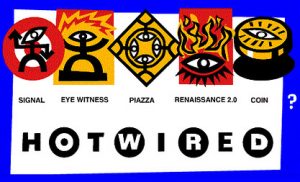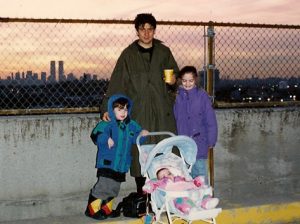
(This is chapter 27 of my ongoing memoir of the Internet industry.)
It never occurred to me, during my early years running Literary Kicks, that I could use the site to discuss contemporary literature or current writers. There were no lit bloggers around (yet) to compare notes about new books with. Literary Kicks had always been about dead writers, about the literature of the past. The contemporary fiction scene barely interested me at all.
It had been better a few years earlier in the late 80s/early 90s, when Paul Auster wrote City of Glass and Nicholson Baker wrote The Mezzanine and Don DeLillo wrote White Noise and Art Speigelman wrote Maus and Donna Tartt wrote The Secret History. Now in the late 1990s I felt postmodern literature was stuck in a phony phase, a mannered phase, more wrapped up in chic style than moral or intellectual substance.
I loved to look at the early McSweeney’s publications produced by the talented Dave Eggers — but I found the fiction in these beautiful books hollow. Probably the hippest postmodern book in town was Infinite Jest by David Foster Wallace, but I didn’t see why he needed 1000 pages to tell that story, and I deeply resented his assumption that I had this much free time. I’m a slow reader, and I had about two good hours of book time each day — an hour on the R train in the morning from Forest Hills to 23rd Street, and an hour during the evening trip back. If I’d stuck with Infinite Jest, it would have occupied half a year.
I felt similarly annoyed by the brutally long and intentionally difficult works of William Vollmann, another postmodern maximalist darling of the time, whose works seemed designed to allow timid brainy readers to prove how tough they were, how much abuse they could take. Me, I’d managed to suffer through books on advanced object oriented programming in C++, so I didn’t need to read William Vollmann to prove I was tough.
I could have had a lot to say, both good and bad, about the literary scene of the late 90s. Thinking back now, I find it hilarious that I was running a popular literary website but never thought to cover the contemporary lit scene online. Sometimes I can be remarkably dense.
I’d sit there reading the New York Times Book Review every weekend, but I never once thought to write anything about it. (Years later, when I began writing about the Book Review on LitKicks, it felt like a revelation that I could do this.)
Where I did find a literary home, though, was not the midtown Manhattan commercial publishing scene but the downtown poetry community. Spoken word was big, and I could hear a wide variety of riveting live poetry shows at the Nuyorican (heavily East Village/political), the Knitting Factory (artsy/hip-hop), KGB (hipster), St. Marks Church (Warhol factory/beatnik) or ABC No Rio (homeless). I made many friends through this scene, like Brian Hassett, a Canadian writer who worked as an office temp at MTV and wanted to arrange poetry shows that we could promote on LitKicks. I was game to try, and we scheduled the first show, a Jack Kerouac tribute reading, to take place at an Lower East Side club called the Living Room on February 10, 1999.

The Living Room was a very cozy place — all couches and big dusty chairs and a humble piano. We didn’t know this then, but around the same time we did our show, a young up-and-coming singer named Norah Jones was playing regular shows at the Living Room. Her future hit song “Don’t Know Why” must have sounded great in this soft, smoky room.
What made Brian Hassett’s show extra special was the presence of David Amram, an awesomely accomplished jazz and classical musician who’d worked with folks like Charles Mingus, Leonard Bernstein, Phish and Bob Dylan. Most famously, though, he’d jammed on french horn with Jack Kerouac in a December 1957 Greenwich Village art gallery reading later remembered as a highlight of Jack Kerouac’s career. So it was pretty amazing that Brian Hassett had convinced David Amram to jam with us at the Living Room, and it was most amazing of all that Amram, a remarkably kind and sensitive man, offered to play piano, french horn and flute behind each of us as we read.
It was certainly a highlight of my life. I chose to read a prose piece called “The History of the California Burrito” from my 1995 Queensboro Ballads story cycle. This is the story of a lonely guy who finds religion by eating a vegetable burrito in a California restaurant, and it’s more or less my fictional tribute to Jack Kerouac. Amram played soft minor chords as I read, and even though I was stagestruck to the point of stuttering I think I managed to keep up some kind of fragmented rhythm during the piece.
I also enjoyed sharing stage time with Steve Dalachinsky, Ann Douglas, Robert Burke Warren, Will Hodgson, Adira Amram (David’s young daughter), Ed Adler, John Grady, haiku master Cor van den Heuvel, Frank Messina, Tony Sampas, Jason Eisenburg and journalist Al Aronowitz. This show was so much fun it made me start to think about bigger shows Brian and I could put on together. But I was pretty busy with my new job, so I shelved that idea for the time.
While I was working myself up to perform at literary events in the East Village, I was also scrambling to put on a credible performance as the “Director of Systems Engineering” at my hectic new job on 22nd Street and Fifth Avenue. Our IPO was now scheduled for late March 1999, about two weeks earlier than everyone had expected. I was in charge of 10 confused and mostly angry software developers and Unix system administrators, and I was supposed to hold down the fort until the new Chief Technology Officer (who’d just been hired) showed up.
A few days after our IPO date was set, I called my first meeting of the entire software department. I felt more nervous here than I had under the spotlight next to David Amram’s piano at the Living Room. I wanted to emphasize how important it was that nothing would go wrong in the next few weeks, so I handed out printouts of articles about highly publicized server crashes at EBay.com and at TheGlobe.com before and after their successful IPOs. “This is what we don’t want to happen,” I said. “The IPO is six weeks away, and the market is very volatile. Any perceived problem could harm the opening price. I don’t care what you have to do, but please keep those servers running until the end of March. We’ll figure out how to fix all our problems after we get there. Okay, go.”
I was later told that I hadn’t made a very good speech, that most of the disgruntled employees had walked away disappointed. They’d wanted to hear all about how great they were and how much iVillage loved them, and all I did was talk about everything that could go wrong. Truth hurt, I know.
At least I got a lot of applause on February 10, at the Living Room with Brian Hassett and David Amram, and that was a much nicer room too.








21 Responses
The Amram clan is a talented
The Amram clan is a talented bunch!
Levi, you don’t miss a crick!
Levi, you don’t miss a crick! I’m going back to the beginning of the memoir to make sure I haven’t.
I will continue reading the
I will continue reading the memoir and not as a masochist. It is hard to remember details accurately but am I the only reader who would’ve liked to hear more about you being up there on the stage, with all those eyeballs on you and your mental state? Did everyone listen or continue quiet conversations?
At that time, I remember reading a lot of short stories, from the Best [North] American Short Stories especially. For a long while, I’d given up on looking for any fiction to read.
Nowadays, I must have slipped out of the reading demographic because nothing appeals to me there anymore. Also, now I do have a hard time finding fiction that appeals to me enough that I will buy it and tote it with me in my luggage.
Thanks for another chapter in
Thanks for another chapter in the memoir, Levi. I find the parts about your personal and literary life very interesting – and the parts about hi-tech and the corporations not interesting at all. This has nothing to do with either you or your writing; it’s just that I have no interest the topic.
Thanks to everybody who’s
Thanks to everybody who’s posted feedback. Always appreciated. Dan, I know that many readers feel that way — at the same time, I’ve also heard from readers who consider the personal/literary stuff a distraction from the main story!
All of it — family, job, technology, literature — is what adds up to the story of my last fifteen years. The personal/literary stuff provides the emotion, but the work/tech stuff hopefully provides the drama. I’m just going to keep my head down and keep telling it.
Dear Levi:
Thanks for
Dear Levi:
Thanks for remembering a wonderful time ten years ago when we all got together for poetry and music.
Just as Jack Kerouac and I did in 1957, when we got together at the tiny Brata Art Gallery for a handful of people to share what we loved to do, our little event at the Living Room in 1999 started many new collaborations with people of all ages which still reverberate today.
Now in New York as well as around the world, the Globalized entertainment Industry’s Penetentiary of Bad Taste is being side-stepped by a SMALL ARMY of gifted people who are creating their OWN venues and creating what THEY LOVE to do!
It is exciting to see this happening and your personal and warm way of recounting your own part of helping to make this happen then and now is a joy to read!
WRITE ON, WRITE ON!
Small is beautiful.
Everyone has a story to tell and a song in their heart to share.
Thank you for sharing yours with us.
David Amram
Yeah man keep your head
Yeah man keep your head down.
Warren,I share your sentiments. I read now almost only biographies.
I think of Amram when I
I think of Amram when I record music, in nearby Feasterville PA. My favorite Auster book: Hand To Mouth
happy to find another
happy to find another installment – must be bizarre to write this, levi, and feel the history roll out of your fingertips. how swift these times flow.
“Globalized entertainment
“Globalized entertainment Industry’s Penetentiary of Bad Taste”
Ha! THAT phrase is absolutely precious! Couldn’t be more true, Mr. Amram.
Levi, write on, brother. I’m the furthest thing from a techie, but I love reading about that part of the memoir. I think it’s a great mix of personal and professional. In fact, I’m taking a queue from you and writing a memoir of mid-life crisis. (Like that’s not been done before!) And I think combining personal with professional is a nice touch. I hope mine turns out as good as yours!
I agree with stevadore.
I agree with stevadore. Combining personal with professional is the way to do it. Enjoyed the latest chapter, as always.
And I have to give a shout-out to David Amram! Music is universal, man.
Norah Jones eh ? yeah she
Norah Jones eh ? yeah she made it big in a hurry, it was borders one day and an arm load of grammys the next. I had to break it off with her when I heard Joss Stone
i finally got around to
i finally got around to reading this part of your memoir. it’s another interesting one, keep them coming!! leftie
Asher’s technical stuff is as
Asher’s technical stuff is as dry as Marshall McLuhan, necessary, I guess
Where would you go to see
Where would you go to see stuff like this in New York these days? I’m coming from Australia in a couple of weeks and would love to listen to some great music and poetry.
Stella, check out the Bowery
Stella, check out the Bowery Poetry Club to start. This club will be showing up in a major way in the future chapters of the memoirs — I haven’t mentioned it yet because they didn’t open till 2002.
Then, the KGB is still open, I think the Nuyorican is too, there’s Vox Pop in Brooklyn and open mics all over — check the Village Voice and NY Press for info. Have fun.
Thanks Levi.
I wrote to you
Thanks Levi.
I wrote to you a couple of weeks ago, to see if I could email you some questions for my PHD research… if you ever have the time I would love to correspond!
If you think that Vollmann’s
If you think that Vollmann’s works “seemed designed to allow timid brainy readers to prove how tough they were,” then you clearly never read Vollmann. His books are about perspectives that no other American writer is willing to investigate. But it’s nice to know that you were turning your truncated and timid reading attention to novels that confirmed your own perspective. 🙂
By the way, always thought Eggers was hollow. Have given him numerous chances over the years.
Ed, I bought and spent a lot
Ed, I bought and spent a lot of time trying to get into “Expelled From Eden”, the Vollmann collection. I really tried hard with that book (and with other Vollmann writings over the years). The topics he writes about are definitely in my area of interest — violence, history, alienation — so I was very disappointed to find his actual ideas and perspectives so run-of-the-mill.
He sure has constructed an impressive literary persona, but I can’t find the substance in his texts to match the hype.
If you give Vollmann another
If you give Vollmann another shot, THE RAINBOW STORIES (or even THE ATLAS) is a good entry point. But if you find Vollmann freezing himself in Alaska or traversing the intoxicated New River to be “run-of-the-mill,” then I don’t know what to say.
Looking forward to getting
Looking forward to getting acquainted with your site. Currently writing a memoir/fiction based on the Indian immigrant experience.